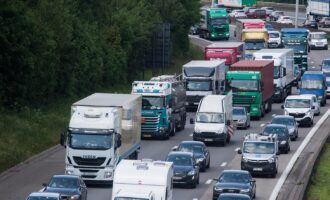
ACEA: ICE will continue to play an important long-term role
The European Automobile Manufacturers’ Association (ACEA) urged the European Commission (EC), in a letter to Frans Timmermans, executive vice president of the EC, to not consider a general phase out date or setting a 100% target for internal combustion engines (ICE) because “they will continue to play an important long-term role in a small, but important range of heavy-duty applications.”
ACEA also urged the commission to “help create a targeted policy approach, tailor-made for Europe’s commercial vehicle industry,” while at the same time, “addressing the huge challenges of transitioning Europe’s transport and logistics sector.”
The association, which represents Europe’s commercial vehicle manufacturers, as well as passenger car manufacturers, warned that the recent proposal for a Euro VII regulation for heavy-duty vehicles carries major risks of slowing down the transition to climate neutrality. Euro VII and CO2 standards for heavy-duty vehicles cannot be looked at in isolation from one another, ACEA said in the letter.
ACEA cited a recent study which was prepared by Aeris on behalf of ACEA, that Euro VII will only provide very marginal additional benefits to air quality, “which will easily be dwarfed by even slightly higher fleet renewal ambitions.”
ACEA stated their strong commitment to provide the right vehicles to swiftly move Europe’s road transport industry into fossil-free solutions by 2040, focussed on battery-electric and hydrogen-powered vehicles.
However, to comply with the proposed Euro VII regulations, ACEA said truck makers and their wider supply chain will have to move substantial engineering and financial resources from battery and fuel-cell electric technologies back to the internal combustion engine. “This is detrimental to our efforts to swiftly decarbonise road transport,” ACEA said.
“The focus should be on the real drivers and bottlenecks to decarbonisation, including measures that enable customers to accelerate fleet renewal and prioritise investments in fossil-free solutions. Europe should therefore aim for a pragmatic, progressive and technology-neutral approach that ensures scalable solutions can serve as the global pacesetter – without detours, such as the Euro VII proposal,” ACEA said.
The Euro VII proposed regulation is creating alarming risks for a level playing field for Europe in relation to other, non-European players, the association said. ACEA noted that other major markets, like the United States, are establishing a policy framework which aims to accelerate the transition to fossil-free alternatives by creating an attractive investment environment for the industry.
“Commercial vehicle manufacturers are truly global players with their home bases in Europe, implementing new technologies wherever market conditions and policy framework allow and support the shift. We continue to stand firmly behind the European Union’s Green Deal objectives to ensure Europe takes a leading role in the transition to a fossil-free road transport industry.
“Therefore, we urge you to help create a targeted policy approach, tailor-made for Europe’s commercial vehicle industry, that is effective and cost-beneficial, while addressing the huge challenges of transitioning Europe’s transport and logistics sector.”
With respect to the upcoming CO2 regulation, according to ACEA this means:
- Setting a fixed 2030 target in line with the industry’s ambitious, yet feasible decarbonisation pathway while taking into account that major uncertainties of crucial enabling conditions persist. • Setting targets for 2035 and 2040 while ensuring they will be reviewed again in due time to assess the state of the enabling conditions.
- Not considering a general internal combustion engine (ICE) phase-out date or the setting of a 100% target because internal combustion engines, powered by fossil-free fuels, will continue to play an important long-term role in a small, but important range of heavy-duty applications.
- Improving the credit/ debit system and extending it beyond 2030 to help mitigate uncertainties of the transition.
- Adding zero-emission driving range as a parameter to an improved zero-emission vehicle (ZEV) incentive system to ensure it is focused on innovation while maintaining the current principle until 2030.
With respect to the heavy-duty vehicle elements of the proposed Euro VII regulation, according to ACEA this means:
- Synchronising and aligning the Euro VII regulation and the CO2 emission targets for 2030 as well as other key regulatory requirements impacting heavy duty vehicles, so that industry can streamline developments into one strategic pathway, not multiple development pathways.
- Revisiting the proposed Euro VII heavy-duty emission limits to something that is proportionate and which industry can deliver without disrupting its efforts towards zero emissions.
- Updating the Euro VII impact assessment with a baseline that reflects the industry’s decarbonisation pathways and the heavy-duty CO2 proposal.









